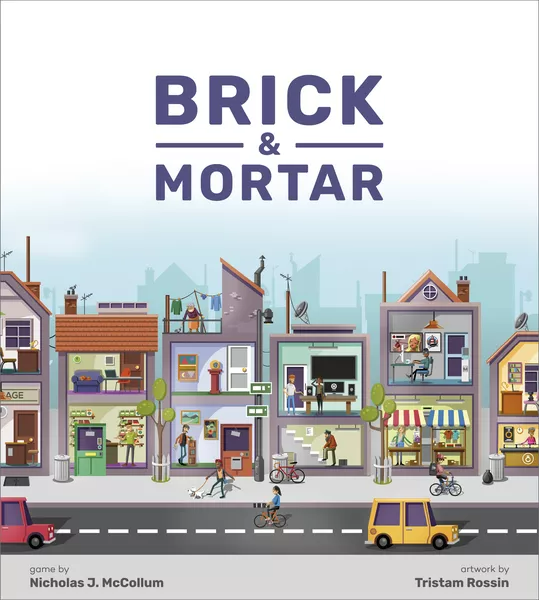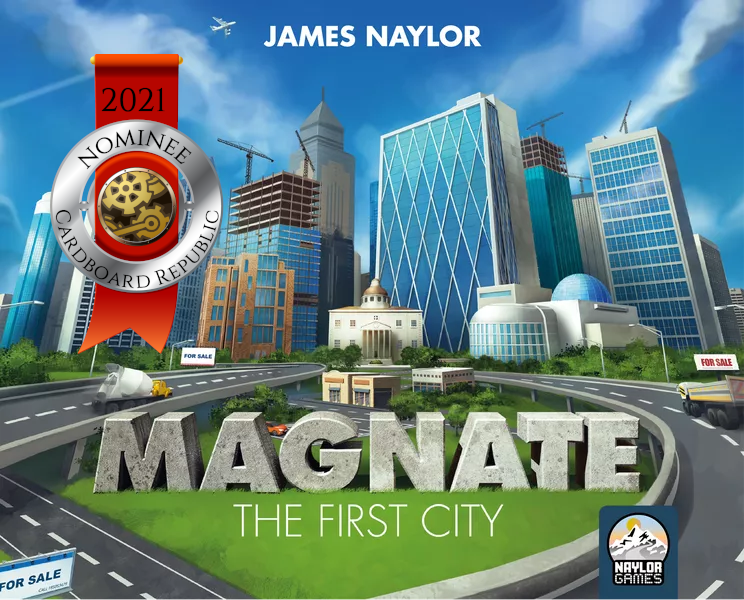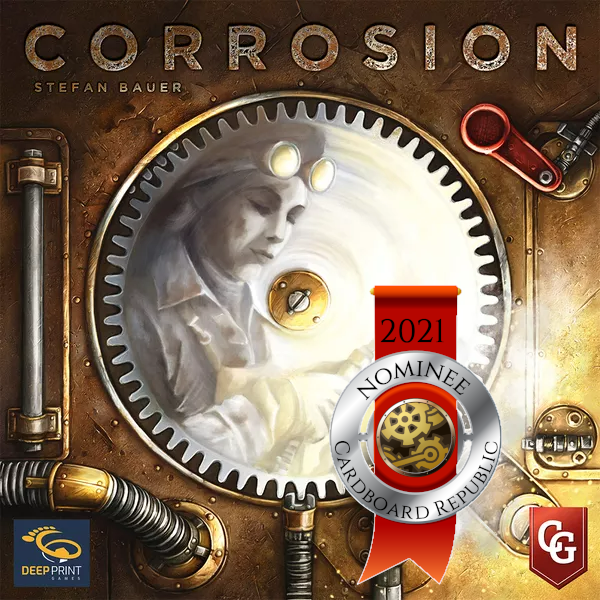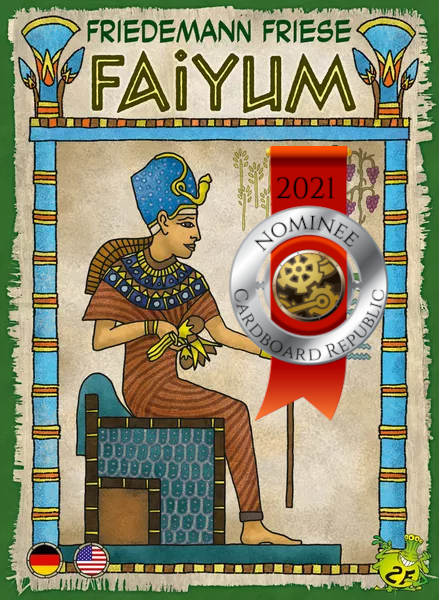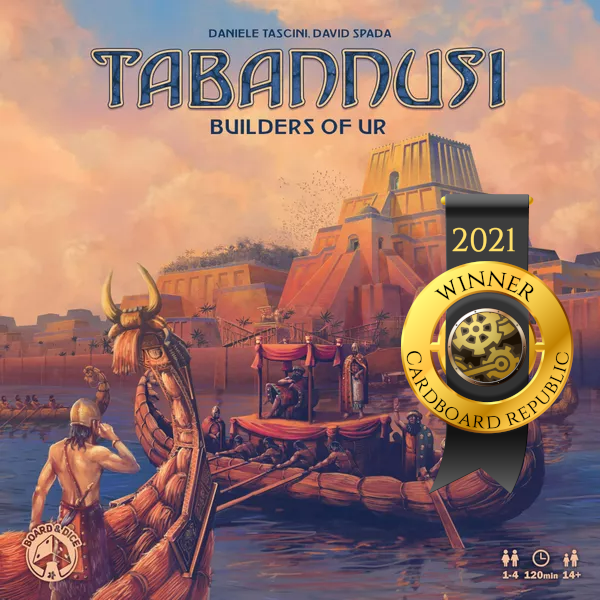The Cardboard Republic has rolled out the annual Laurels of the Republic awards, celebrating the best new games released in 2021 for each of the gamer archetypes. What follows are the finalists for one of those groups.
 The greatest moment for a Tactician isn’t when they cross the finish line or they best another player. Rather, it’s when all of their moving pieces and disparate strategic decisions coalesce as their carefully laid plan comes to fruition. Always the consummate schemers, Tacticians adore games that not only let them look at things in the long term but are flexible enough that it can be accomplished in different ways. Most Tacticians use layers to their plotting, adjusting if things don’t go exactly as they’d hope – which is almost guaranteed – and they’re adept at leveraging turn-based options to the fullest even if the game doesn’t permit focusing on a grand vision.
The greatest moment for a Tactician isn’t when they cross the finish line or they best another player. Rather, it’s when all of their moving pieces and disparate strategic decisions coalesce as their carefully laid plan comes to fruition. Always the consummate schemers, Tacticians adore games that not only let them look at things in the long term but are flexible enough that it can be accomplished in different ways. Most Tacticians use layers to their plotting, adjusting if things don’t go exactly as they’d hope – which is almost guaranteed – and they’re adept at leveraging turn-based options to the fullest even if the game doesn’t permit focusing on a grand vision.
And with that, here are The 2021 Laurel Finalists for Tacticians:
Honorable Mention: Brick & Mortar
Publisher: Octoraffe Games | Players: 2-4 | Play Time: 60-120 Minutes
Even during the preliminary rounds of this whole process, it was readily apparent 2021 was a particularly solid year for fans of games that revel in planning and plotting. While this admittedly made it a very competitive field to wade through, we were more than happy to do so.
For one, it served as a solid indicator that after a year of pandemic-riddled difficulties getting even lighter fare played, let alone published, the industry was slowly returning to a closer-to-normal release pattern. But also, it meant there are dozens of estimable new titles out there for their respective audiences to explore and enjoy – including those which may have been initially overlooked. And that’s a net positive for everyone.
Case in point: Brick & Mortar, an economic bidding game with a pure, distilled, and unrestrained focus on the fundamental laws of supply and demand. This title flew completely under our radar, in part due to its crowdfunded origins and Q4 release, but that was thankfully rectified. Because Brick & Mortar may be one of the best games to center around the adage of ‘buy low, sell high’ in quite some time, all through a simple but highly interactive gameplay experience.
Brick & Mortar is firmly about manipulating economic conditions before you with the sole and express intent of generating the most money (and in turn, the most VP). Through a series of easy to navigate rounds, players first collectively play cards to seed the market with a variable number of goods of different kinds, with the express intent of getting them into their store to sell. Stores in the game are plentiful and varied, each with an effect that slightly alters the normal process in ways you hope to use to your advantage. And if they don’t, there’s ample opportunity to invest in another.
If there’s not enough supply to meet a good’s overall demand (and there usually isn’t), you must bid on what you’re willing you pay for it. Bid too high and risk your profit margins. Too low and there may not be any left for you at the end. Then stores try to make sales, with those willing to sell the cheapest getting to meet audience demand first, and the same principle applies in reverse. Rinse and repeat.
Benign on the surface, Brick & Mortar instead offers an approachable, unassuming, and visually appealing game about abject cutthroat business tactics. Its market may continually be in flux, but it’s not so volatile to dissuade Tacticians with a solid business plan. Quite the opposite. Indeed, only through careful maintenance of your funding and cannily timed moves to shift conditions in your favor do you stand a chance in this retail jungle.
The Nominees

Number Five: Magnate: The First City
Publisher: Naylor Games | Players: 1-5 | Play Time: 60-120 Minutes
What drives real estate valuations and activities in a given location? Broader economic conditions, surely. Environmental conditions, governmental policies, interest rates too, of course. Proximity to desirable nearby resources and amenities, and the ever-classic mantra of supply and demand? Practically inviolable.
But you know what else can cause it?
Hype. Good old fashioned hype.
Hype can cause an entire influx of new property owners to descend en masse on sleepy hamlets and hype can facilitate a death spiral of concerted selloffs if everyone sees their neighbor cashing out for some reason – legitimate or not – and decides to follow suit. Hype need not be rational or the optimal choice, but it can undoubtedly be a powerful force in driving real estate to dizzying highs or mournful lows.
Riding such waves can also be massively profitable. Because capitalism.
This is the thrust behind Magnate, a well-produced and visually enticing economic game of real estate chicanery that’s all about intentionally feeding an economic bubble and raking in as much money as possible before its eventual, inevitable burst. Possibly by your own hand.
Through its thoughtful and thematically integrated mechanics, each round in Magnate has players operating from a scant handful of rudimentary actions, largely distilling down into some combination of buying property, constructing buildings as to lure rent-paying tenants, and selling off said property later for a tidy profit. Yet rather than relying on a deep bench of actions or cascading effects that necessitate an inherent need for continually thinking ahead, Magnate’s complexities instead are more nuanced, relying extensively around precision timing and savvy market maneuvering to guarantee the best return on your investments. Piloted carefully, even the game’s variable, volatile, and inexorable market bust can be factored into your financial portfolio equations.
On its money-grabbing surface, Magnate shares some similarities to another famous board game about scooping up property and plastering it with expensive buildings for beaucoup bucks. But unlike Monopoly, Magnate relies less on sheer luck for market changes and far more on the direct actions of its players. Moreover, despite a premise and ultimate objective that would make Gordon Gekko proud, Magnate is at least partially in on the farce, being fully cognizant of the unsustainable consequences of unfettered market greed. Even if it does leave dealing with the fallout of such things to another day.
Magnate is smartly conceived, ably designed, and painlessly executed. It provides a gripping high stakes escapade of exploiting a runaway real estate market before judiciously jumping off just shy of when it all collapses, with victory driven largely by mindful investments and astute course adjustments.
Put simply, Magnate is exactly the sort of midweight economic game for Tacticians to be bullish over.
Number Four: Corrosion
Publisher: Capstone Games | Players: 1-4 | Play Time: 60-120 Minutes
To say that a Tactician loves plotting out a solid blueprint to victory is an understatement. More than any other group, these are the gamers who don’t just revel in a well-executed plan but actively seek them out. Always emphasizing organized, clockwork-like machinations, being able to stare at the larger picture and map a course through the strategic puzzle before them is akin to cerebral ambrosia.
To say that’s all this layered group focuses on, however, would be is a miscalculation, and a grievous one at that. For a plan is nothing if not a series of carefully strung together choices, and there is near-equal affection for games that focus on synergistic opportunities to aid their purposes.
In other words, sometimes a game with loads of combo-potential and elegant mechanical interactions, where you get to focus on the cogs as much as the larger machine, is every bit as appealing.
Corrosion is proof positive of that.
Corrosion, as the name slyly alludes to, is a system building game where time is not on your side. This test of precision engineering carries with all the hallmarks of a game requiring extensive forethought, including a tight economy, limited individual actions, and the ability to generate lucrative, cascading turns borne from the carefully prepared turns preceding them. Through your stratagems you can generate a slate of returns for your efforts both emotionally and competitively rewarding. Set up correctly, properly executing the timing of your combo-laden engines can make for some wonderful gameplay moments.
The spanner in the gears to all this, however, is that’s marvelously, maddeningly transitory.
Throughout your mechanical spin cycles, each turn you either perform a singular action by way of playing an engineer card to your board (and locking it in place) or rotating your board’s dial. Actions in your steampunk-adjacent efforts include generating resources, gaining machines that trigger each time you rotate, or gaining machines that trigger one-shot effects once activated.
The catch is that once your board rotates, everything besides your engineers on the newly rotated spot crumbles and rusts away. Effectively, Corrosion is a combo engine race for VP – except that pieces of your engine itself are continuously falling apart in the process.
In this ever-shifting puzzle Corrosion doesn’t offer a single linear masterstroke but successive waves of smaller plans strung together over the long haul. Nevertheless, this relentless scramble requires diligence in being adaptable, a knack for optimizing in a small window of time, and the perspicacity to still think beyond the current cycle towards the next.
With extensive considerations to weigh and ample room to adeptly combine your efforts, this is every bit the sort of game to enter this group’s favorable rotation.
Number Three: Imperial Steam
Publisher: Capstone Games | Players: 2-4 | Play Time: 120-150 Minutes
Imperial Steam is heavy game about trains. Stop us if you’ve heard this one before.
We get it. Few associations in board gaming are as common as the pairing of route-building railroad titles and a weight class populated by hefty commitments to sophisticated logistic challenges. For every happy-go-lucky lightweight like Ticket to Ride there are a half dozen heavier, knottier train games to test your economic management capabilities through financial finagling, stock manipulating, and organizational maneuvering. Which includes nearly the entire 18XX genre.
Here’s the thing though: while they may be common, that doesn’t mean they’re bad. Or boring. At least to their intended audience of schemers and planners.
Imperial Steam is a perfect 2021 example.
Set in the mid 19th century industrialization of Austria, players are industrial mavens with the relentless financial imperative to make even more money. Starting in Vienna with some factories and a modest rail line, your overarching, high-level objective is forthright: recruit workers to power your factories and lay track to new cities. These connections in turn allow you to sell goods to fund more factories and more track, all as you work your way to the lucrative port city of Trieste. Once someone does, you want to be holding the most gulden.
As ever with games of this magnitude, however, the devil is in the details.
In several areas Imperial Steam bears framework similarities to Alexander Huemer’s previous heavy hitter Lignum, as both require an attention to detail and the necessity to scrupulously wind your way through an unforgiving economy. Goals both short term and long teeter precipitously thanks to stoic, almost rigid market conditions and the opportunistic actions of your opponents, requiring a deft hand to stay on course. Woe be to the unprepared should someone claim a contract or resource before you do.
Compounding this is that cash is often in short supply as the costs of expanding your holdings continually escalate, with new infusions of capital limited at best and punitive at worst. To ensure you can keep your progress engine going, it takes a concerted effort to routinely map out how to best leverage your current turn to afford your next. And then the turn after that.
With a dizzying degree of variability from randomized setups and dynamic strategic courses to consider, Imperial Steam’s mission is basic but accomplishing it is as unyielding as it is rewarding. With few guardrails or guideposts, success is solely a mix of grit and guile. Tacticians, naturally, are fully on board with this one – a game that rewards those with a penchant for developing a plan early and trying to hew to it as much as possible while continually adjusting course all the same.
Number Two: Faiyum
Publisher: Rio Grande Games | Players: 1-5 | Play Time: 110-140 Minutes
While there has been a growing trend over the last decade from many European game publishers to distribute directly into North American markets, the esteemed and eclectic designer Friedemann Friese and his 2F-Spiele brand have long preferred to stick with the traditional model of using a US partner instead.
For years this was Rio Grande Games, followed by Stronghold Games, followed by a couple year gap where there wasn’t one. Which is why despite technically being a 2020 release Faiyum didn’t see widespread release in the US (a stint in the BGG Store aside) until mid-2021 when 2F-Spiele re-partnered with Rio Grande. Hence why we’re celebrating it here.
And we absolutely should, for Faiyum is Friese’s heaviest and most compelling Euro title since Power Grid itself.
Also crocodiles. Crocodiles everywhere.
In this sprawling game of developing a new river basin, each player is one of the pharaoh’s advisors in an attempt to gain the most reputation for assisting in the reclamation and construction of an arable region along the Nile. Turns are deceptively simple on the surface, consisting of playing a card from your hand to perform its action, which may include gaining resources, recruiting workers, building roads, farms, settlements, and so on. What, where, and when you choose to construct are all important considerations, however, as once complete everyone is then capable of using the results – for the great pharaoh owns all. To stay ahead of the competition, throughout Faiyum you will also routinely purchase more powerful cards, giving you new and/or upgraded strategic card options to bolster your efforts in the eyes of the god-king.
The hitch to all of this urban influence-mongering is that when you wish to reclaim your previously played cards, they are returned in the reverse order you played them. While the first few are free, it becomes increasingly (even prohibitively) expensive to recoup everything. This delightfully thinky pain point therefore forces you to continuously consider not just what you hope to accomplish throughout the game but the most efficient steps in which to perform them – all while accounting for everyone else attempting the same ends. Only by evolving basic actions into a cohesive gameplan will you be worthy of the favor you desperately seek.
In effect, Faiyum mixes the nuanced hand management and tight resource economy of a game like Concordia with Power Grid’s own jockeying for more powerful cards and its strategic-yet-appreciable route building aesthetic – all thematically set on an ancient Egyptian river delta. It’s a vaunted comparison but one Faiyum ably lives up to.
In this elegant but calculating game of urban planning, timing and order of operations are paramount, a divine challenge to Tacticians if there ever was one.
And it was this close to claiming this year’s top spot too, if not for another title of the ancient world…
The Winner
2021 Tactician Laurel – Tabannusi: Builders of Ur
Publisher: Board & Dice | Players: 1-4 | Play Time: 120 Minutes
A general rule of thumb is that the heavier and more involved a game gets, the number of interested players drops. While there are many distinctly drawn to such titles (particularly among this archetype), heavier games do bring with them additional burdens. Not everyone has the needed desire to navigate deeply interwoven game systems, the attention span to pull off a successful strategy, and/or the time commitment to play hours-long titles. Fewer still want to dig through a graphic novel sized rulebook to do so.
Those that typically stand out are therefore often ingeniously crafted to be complex without being overly complicated. Games refined and honed to the point where you may only have a handful of options but those options are packed with strategic possibilities that quickly unfold into a highly integrated operative maze. Such games ignite the excitement of tinkerers and plotters as straightforward but limited selections inevitably force you to stack one meticulous, weighted, and sometimes even anguished choice after another together into a workable, winnable solution.
Tabannusi is a prime instance of such a game.
It’s also driven home all the more because somehow – somehow! – co-designer Daniele Tascini has pulled off that feat once again through the central tenant of drafting dice.
You’d think we’d not be shocked at this point. And yet…
Tabannusi whisks you back thousands of years to the founding of the great Sumerian city Ur, where it is your charge as one of the city’s chief architects to prove your worth by leaving a bigger mark than your competitors. Your primary means of accomplishing this is by bouncing around the game’s five zones, each containing an associated barge of dice. Over five rounds of variable length, players take turns selecting a die from their location and then performing a pair of actions, with die’s value corresponding to one of the regions. Exemplifying the necessity to ply your planning acumen, however, your die movement comes at the end of your turn, routinely forcing you to calculate next steps before even taking your current one.
Actions in Tabannusi vary, though most fittingly revolve around constructing buildings. Yet doing so involves navigating increasingly tight quarters and tighter resources, as the game both restricts and rewards you differently depending on the style of building you opt for and where you’re trying to build it. Nearly everything else, including your scoring potential, stems from the confluence of those literally foundational choices.
Buried beneath a baseline of seemingly elemental choices in Tabannusi is a highly interconnected mechanical latticework that rewards shrewd timing and carefully bringing disparate actions together for valuable payoffs. It’s calculating and occasionally laborious, but to this group, precisely their kind of blueprint for entertainment.
All of which laid out quite well why Tabannusi is deserving of the Tactician Laurel of 2021.
![]()
Tabannusi Contest!
As is often the standard focus, when we were finalizing this heavy-hitters list awhile back we knew we wanted to come up with some way of drawing special attention to how impressive the winner of the Tactician Laurel is. We pondered, debated, argued, and openly suggested numerous ways we could celebrate the complex and and intricate urban construction nature of Tabannusi without getting too in over our heads on the whole matter. Which according to certain members of the team, we sometimes have a habit of doing. Too aspirational. Too complicated. Too many civil infractions we still refuse to pay. Of course, our retort is that it only means we really strive to go that extra mile in celebration of the winner. Even if it usually ends up with at least one shouting match a season with Verizon, the FAA, or the Daughters of the American Revolution. It’s not our fault we care too much.
Anyways…
To avoid large scale concerns this time around we toyed with more localized ways to champion the game, from a “Supermarket Sweep” style scavenger hunt for specific reference material at a library to a spirited rowboat race through some nearby canals. We even briefly considered borrowing a vacant construction lot for people to compete to physically build a thematically relevant structure of the Sumerian period, which we were pretty excited about. Yet we ran into a host of issues, including a stubborn owner and permitting delays, but mostly because we couldn’t get the town zoning board to decide what kind of structure a ziggurat qualifies as. Which, whatever. Their loss. Could’ve really put the town on the map.
At any rate, in the end we realized that the easiest option was to simply go with the flow by providing one lucky winner with the opportunity to enjoy this award-winning game first hand in exchange for a simple contest entry.
That’s right! Enter below for your chance at your very own copy of Tabannusi!
One Copy of Tabannusi
![]()
All of the 2021 Laurel Award pages for the other archetypes are now live!

